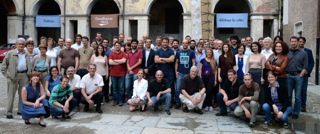Speaker
Dr
Timo Peltola
(Helsinki Institute of Physics)
Description
Interpixel isolation and charge sharing before and after irradiation in the proposed Phase II planar pixel n-on-p detectors was studied by TCAD simulations. Both p-spray and p-stop isolated devices with varied isolation doping concentration and depth as well as interface charge density were investigated. The results show that the acceptors in the isolation implantation are compensating the radiation induced surface traps leading to a local minimum of the interpixel resistance as a function of p-spray doping.
Effect of Atomic Layer Deposition (ALD) passivation-layer materials with different dielectric constants and thicknesses on breakdown voltage in 25x100 pixels was also investigated. The negative oxide charge in thin-film ALD-oxide provides strip isolation without any additional isolation structures, thus avoiding their higher processing complexity. The results were also compared to corresponding breakdown voltages of pixels with conventional isolation implantations.
Summary
Interpixel isolation and charge sharing before and after irradiation in the proposed Phase II planar pixel detectors was studied by TCAD simulations. Effect of different ALD passivation-layer materials on breakdown voltage in 25x100 pixels was also investigated and compared with the results from pixels with isolation implantations.
Author
Dr
Timo Peltola
(Helsinki Institute of Physics)
Co-authors
Dr
Jaakko Härkönen
(Ruđer Bošković Institute)
Dr
Panja Luukka
(Helsinki Institute of Physics)

